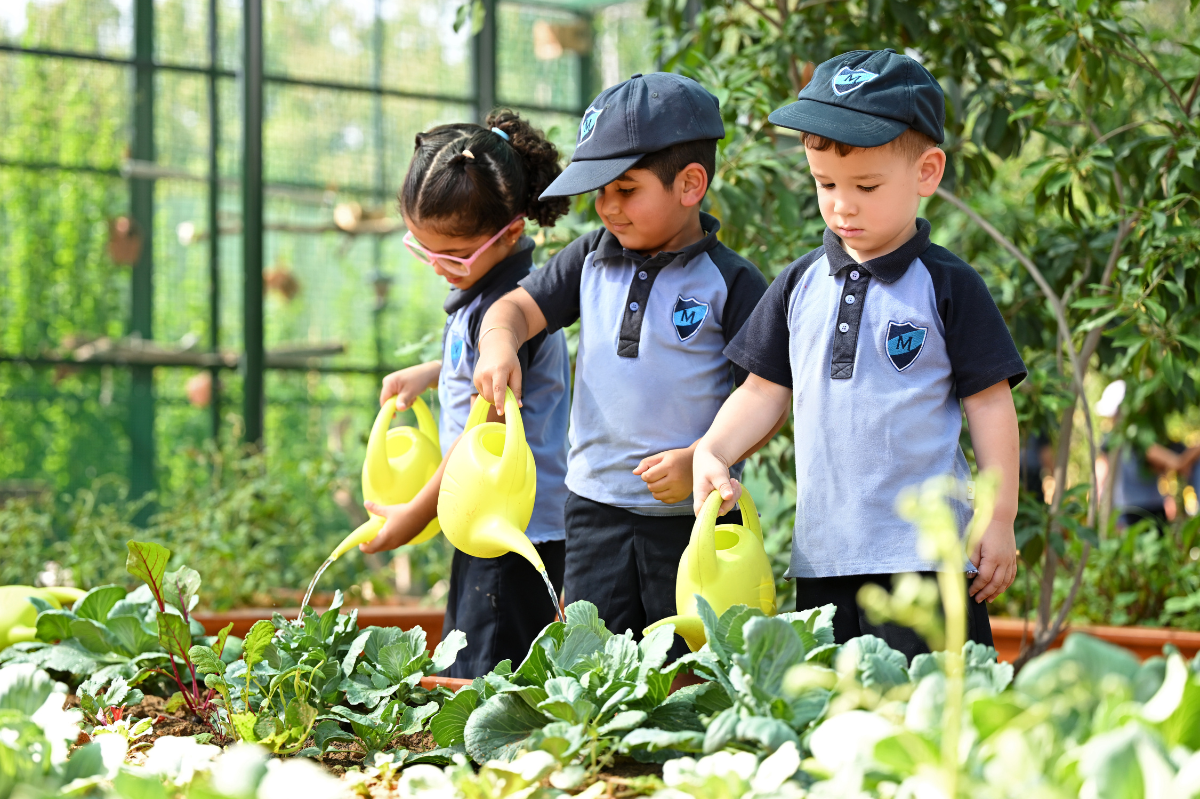The United Arab Emirates (UAE) is known for its multicultural population, communities, and values, and the same goes for the country’s education system. There are many excellent options for school programmes in the UAE, and a popular one is the National Curriculum of England otherwise known as the British curriculum.
In a previous blog, we discussed key facts about the British curriculum, which includes the key stages students go through. This guide takes that a step further and dives into the important details of each stage. The key stages of the British curriculum are as follows:
- Foundation Stage (ages 3-5)
- FS1 - ages 3-4
- FS2 - ages 4-5
- Key Stage 1 (Years 1 - 2)
- Key Stage 2 (Years 3 - 6)
- Key Stage 3 (Years 7 - 9)
- Key Stage 4 (Years 10 - 11)
- Key Stage 5 (Sixth Form)

Foundation Stage (Ages 3 - 5)
For British curriculum students, learning begins as early as three years old. The Foundation Stage, or the Early Years Foundations Stage (EYFS), teaches pre-school-age students the core skills and knowledge they will need for their primary education.
The Foundation Stage begins with reception class. Here, children between three and four years old focus on developing three main areas of learning:
- Communication, Language, and Phonics
- Physical Development
- Personal and Social Development
Some UAE schools offering the EYFS programme also teach specific areas of learning, particularly literacy, mathematics, sciences, and expressive arts. Foundation Stage 1 focuses on play-based learning to engage young learners in this early stage of their education.
During the Foundation Stage, British curriculum schools assess the current level of knowledge and skills of each student. This allows them to create a teaching plan that is tailored to each child’s needs. This learning framework typically involves carefully planned playtime and skills-focused, teacher-led activities.
Assessments
Children undergo a Baseline Assessment (also known as the Reception Baseline Assessment in the UK) at some point during the first six weeks in the Foundation Stage (FS1). This activity helps the teachers understand their students’ level of proficiency in language, communication, literacy, and mathematics.
Note that this is not meant to judge the students. Instead, it allows the teachers to get to know them better and create a more suitable learning plan for them.
By the second part of the Foundation Stage (FS2), the teachers develop an Early Years Foundation Stage Profile for each student by observing them, conducting low-stakes assessments, and creating a portfolio of their school work.
The Early Years programme helps young students to transition smoothly into classroom-based learning. It teaches them essential skills so they can progress across the different stages of the British curriculum with ease.
Key Stage 1 (Years 1 - 2)
At age five, students begin to go through the first of five learning stages within the British framework. Key Stage 1 (KS1) covers Years 1 and 2, where students are taught several core subjects, such as:
- English and phonics
- Technology
- History
- Art
- Music
- Geography
British schools in the UAE may also offer Islamic studies, Arabic language, UAE social studies, and moral education.
The primary goal of KS1 is to build upon the skills students developed during the Foundation Stage. Its focus is to help students become independent learners by mastering the basic skills they need for further learning. This includes:
- Reading
- Spelling and vocabulary
- Handwriting
- Grammar and composition
- A basic understanding of numbers and place value
- Addition and subtraction
- The ability to use practical scientific method (questions, observation, testing, and data collection)
Teachers guide the students to become more inquisitive learners and explore different subjects as they grow within the British school system.
During their two-year stay at KS1, students develop a basic understanding of the core subjects and grow from a play-based education into classroom-based learning.
Assessments
During the first half of KS1 (Year 1), students undergo a teacher-supervised phonics screening assessment. If your child doesn’t pass the first time, they can retake this test in Year 2, along with a science test.
In Year 2, students also undergo National Assessments on grammar, punctuation, spelling, English reading, and mathematics. These assessments determine in which groups a child will be placed in Key Stage 2.
Key Stage 2 (Years 3 - 6)
Upon reaching seven years old, British curriculum pupils enter the Key Stage 2 (KS2), which runs from Year 3 through Year 6 (age 11).
At the start of KS2, students should be able to understand narratives and decode new words outside of their day-to-day vocabulary. During this stage, students develop skills crucial for secondary school, including creative writing and reading more complex books. This allows them to prepare for their tasks in Key Stage 3.
Among the core subjects taught in KS2 are:
- English
- Mathematics
- Science
- Art and design
- Geography
- History
- International languages
- Music
- Physical education
- Arabic A
In the UAE, Muslim students will also have Islamic studies as a subject.
At this point, the children should be able to learn and understand unfamiliar words independently. They are also taught to perform written and mental arithmetic calculations and deal with complex number problems.
In KS2, students also learn to read, use, and make graphs, charts, and diagrams. They can provide arguments that support or refute certain ideas, both verbally and in writing. They should also be able to:
- observe changes, patterns, and classifications of things
- gather, record, classify, and present information
- develop ideas about the functions, interactions, and relationships of the things around them
- conduct tests to confirm their theories
- draw simple conclusions
- use the scientific method
Assessments
British schools conduct tests to determine the development of their students through teacher assessments for English, mathematics, and science.
The students also undergo national tests for English and mathematics at the end of Year 6. The UK Standard Attainment Tests (SATs) (not to be confused with American Curriculum SATs, which occur at the end of high school) determine the aptitude groups that students will be placed into from Year 7.
The National Curriculum of England SATs, combined with teachers’ assessments, allow the school to determine each student’s overall knowledge and ability in the subjects covered, and not just in a test environment. The SAT also gives parents and teachers a way to see how children compare with their peers at a school and national level, offering insight into their academic prowess and areas of improvement.
Key Stage 3 (Years 7 - 9)
The Key Stage 3 (KS3) is the first half of secondary education for British curriculum students, which covers Year 7 (age 11) to Year 9 (age 14). At this stage, students are given more focused knowledge on the core subjects they learned in KS2, along with some relationship education and foreign language learning.
In this stage, students are taught to think more independently and hone their language skills. Teachers also help them better understand classic and modern literature, such as poems and prose. This allows them to develop a love for reading and cultivate critical thinking, enabling them to:
- understand figures of speech well
- recognise poetic conventions
- write accurately and effectively for various audiences and purposes
- give short speeches and presentations
Once they complete KS3, they should also be able to apply their knowledge of maths to practical financial situations, reason using ratios and proportions, and compute variables in algebraic and trigonometric expressions.
At the end of KS3, students will be asked to choose the subjects that they wish to study for their General Certificate of Secondary Education (GCSE) assessments. These choices are the prerogative of the student, but it is widely recommended to keep a balanced breadth of subjects to keep the students’ options open for A-level studies.
Key Stage 4 (Years 10 - 11)
British school students aged 14 to 16 years enter Key Stage 4 (KS4) and undergo the General Certificate of Secondary Education (GCSE) framework. The core subjects of this framework are English language, mathematics, core and advanced science, and a choice of four other subjects, including:
- Arts (Art and design, drama, dance, music, and media arts)
- Design and technology (Graphic design, woodwork, textiles, food technology)
- Humanities (geography and history)
- Modern foreign languages (French, Spanish and German)
- Further science (physics, chemistry and biology)
Students in KS4 are also recommended to continue with their English literature education, building on what they learned in KS3. Students are taught to analyse texts and compare them to more recent works. The English literature syllabus includes:
- Plays by Shakespeare
- Titles published in the 19th century
- Poetry from the 1700s
Assessments
Year 10 and Year 11 students may take the GCSEs, the International General Certificate of Secondary Education (IGCSE) subject exams, or other national exams to demonstrate their knowledge. These assessments will determine which colleges and Sixth Form centres students may be admitted to, and whether they can continue studying specific subjects. Following the GCSE assessments, students may decide to continue on the British Curriculum into KS5 or change to another curriculum, like the International Baccalaureate (IB).
Key Stage 5 (Sixth Form)
The Key Stage 5 (Sixth Form) is a college-level phase of the British curriculum and is typically taken by students aged 16 to 18. This covers two years (Years 12 and 13), where students are given the opportunity to specialise in a subject in preparation for their future careers.
KS5 students in the British curriculum are given more autonomy to choose their subjects for further study. Students may decide to maintain a wide breadth of subjects to give them more options for university study, or they may decide to specialise for more vocational courses.
The options your child chooses in KS5 can determine what they can study at university level. If your child is interested in studying Medicine, for example, some university courses may require one science A-level and a Mathematics A-level qualification.
In this stage, students undergo more challenging and intense courses in their chosen subjects, from classroom-based subjects, like physics or maths, to more practical subjects like media studies or design. Aside from focused learning, they can get guidance from specialists in their chosen fields. This allows them to gain in-depth knowledge based on mentors’ real-world experiences.
Assessments
Sixth Form students can take the General Certificate of Education Advanced Level Examinations – commonly known as the A-level exams – at the end of KS5. This serves as their certification to qualify for the university of their choice. These exams can also impact a student’s future career opportunities, as employers often consider A-level results when hiring.
If your child is more focused on vocational or practical learning, another option for their KS5 studies is the Business and Technology Educational Council (BTEC) route. BTECs provide a real-world approach to learning, giving students practical, hands-on experience in their chosen subject, from sport to IT.
Secure Your Child’s Academic Excellence
The British curriculum offers a comprehensive educational journey for students in the UAE. For top-notch programmes, explore schools like GEMS Metropole School - Al Waha, GEMS Al Barsha National School and GEMS FirstPoint School - Dubai. Contact GEMS Education to learn more about our offerings and ensure your child’s educational excellence.
More Popular Blogs
-
Can you do IB after CBSE? Here are important things you need to know if you plan to transfer your child from a CBSE to an IB curriculum school.Read More
-
What are the benefits of taking the IB Diploma Programme? Learn about what the IB diploma is here and how it can boost your university applications.Read More
-
Summer programs for school students in dubai, summer camps for children in the UAE.Read More









